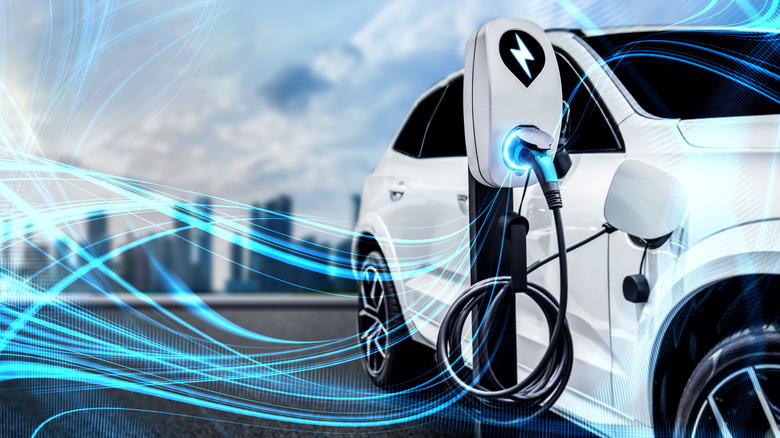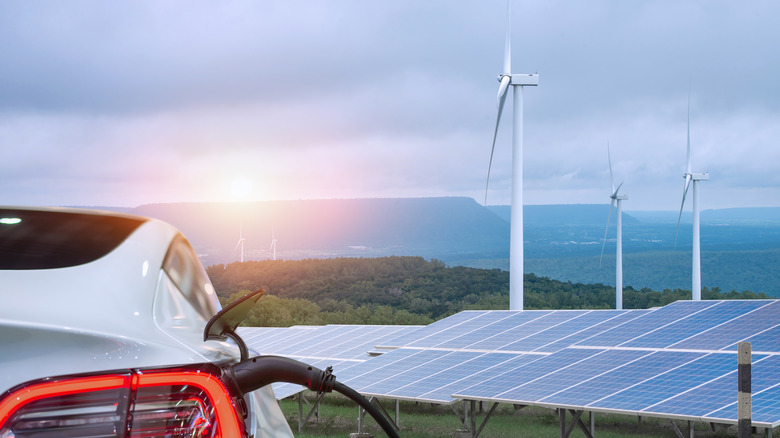The Hidden Costs Of Electric Car Ownership You Need To Know
Electric vehicles provide a fantastic opportunity for drivers to make the switch and contribute positively to the global environment that we all share. Electric vehicles have come a long way in recent years, and with ranges that have become competitive with internal combustion engine (ICE) cars, the purchase of an EV looks more worthwhile than perhaps ever before (via Citroen).
However, there are some severe costs that come along with the ownership and operation of an electric vehicle. For one thing, tax credits for U.S.-based EV buyers have become thinner and harder to take advantage of. In the early days of EV adoption, buyers were able to snag fantastic tax incentives as a result of their purchase, and this made the upfront cost of transitioning to an electric powered vehicle far less damaging. Today, buyers are seeing less of these tacked-on incentives (per CNBC), and yet electric vehicles remain a fantastic option for many drivers in urban and suburban environments alike. Making the change can transform the way you think of your daily commute, but it's important to understand the total cost of EV ownership that extends beyond the price tag offered up at the dealership.
For one thing, you'll obviously have to pay for electricity to charge the car, and this can fluctuate dramatically based on where you live and what is happening in the world around you. But this isn't the only cost of ownership that must be squared in your budget.
Battery replacement is a 'when,' not an 'if'
Electric vehicles are powered by a combination of battery capacity and a specialized engine that works with electric power, rather than gasoline or diesel fuel (via U.S. Department of Energy). As a result, electric vehicles require two significant components to propel them when in use. The typical vehicle on American roadways today likely won't require an engine replacement/rebuild unless it is an older vehicle or being used as an antique/enthusiast vehicle. Conversely, electric vehicles will require a new battery to continue functioning at optimal performance if the car is owned and driven for long enough. EV Connect notes that a typical battery will lose just under 2.5% of its full capacity when charged after each year of use. And this loss of productivity only continues to grow as you drive the car longer and longer.
Rather than decades of service, EV owners are looking at years before they have to replace the most critical component of the vehicle. There are some dramatic benefits that electric vehicle use can provide — most prominently is the rejection of the gas station pump. However, the Institute for Energy Research reports that the battery pack on an electric vehicle makes up 30% to 40% of the car's total cost, and so replacing this component can be a significantly expensive requirement in order to keep your vehicle on the road.
Battery degradation impacts resale value more thoroughly than ICE propulsion
Because batteries are so costly and important in the utility of an electric vehicle, this component affects resale value far more than the propulsion system of an internal combustion engine vehicle. If well maintained, there's a good chance that a 1990 — or even 1980 — Toyota or Ford vehicle would provide reliable transportation with the original engine still in the car. The same can't be said for an electric battery of the same age.
The result of replacement requirements means that electric vehicles lose resale value far more dramatically than traditional gasoline powered cars. MotorTrader notes that buyers (as reported in 2019) were three times more likely to buy a used car. EDF Energy reports that used EVs can be found at severely discounted prices, yet the threat of battery replacement creeping up on you can act as a real deterrent — and puts significant doubt in the mind of the buyer. As a buyer, even if you're able to snag a great bargain on the vehicle itself, the cost to replace the battery will ultimately fall to you. That could very quickly negate any of the savings you may have enjoyed in the short term.
Conversely, because of this depressed resale value and the savings that buyers are able to take advantage of, the used market for EVs today heavily favors buyers over sellers. This relationship can only be thought of as an embedded cost of ownership when considering the true tally of an EV's price tag.


